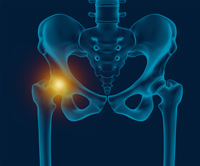Diagnosis of Hip Pain
Your doctor will evaluate your condition based on your medical history, a physical examination of the hip and thigh region, and diagnostic tests including X-rays and other scans.
Treatments for Hip Pain
Self-care and pain-relieving anti-inflammatory medications offer symptomatic relief. However, the exact cause for the pain needs to be addressed. Practising certain measures can avoid aggravation of pain and improve the quality of life. Avoiding physical activities that may worsen the pain, stretching the quadriceps and hamstring muscles, performing warm-up exercises before your actual exercise regimen can help improve your condition. Applying ice packs over the region for about 15 minutes, three to four times daily can reduce both pain and swelling. But if you have an injury with severe hip pain and swelling, talk to your orthopaedic surgeon immediately for better treatment outcomes.












